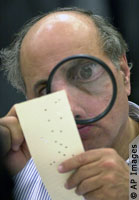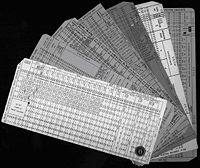Punch card: Difference between revisions
Pat Palmer (talk | contribs) |
mNo edit summary |
||
| Line 39: | Line 39: | ||
==References== | ==References== | ||
<references/> | <references/>[[Category:Suggestion Bot Tag]] | ||
Latest revision as of 11:01, 8 October 2024

An election worker closely examines a Florida punch card ballot from the 2000 US Presidential election for signs of a hanging chad.
Punch card (alternately hollerith card) is a term for cards used for storing information.[1] Herman Hollerith is credited with the invention of the media for storing information from the United States Census of 1890.
Hollerith reasoned that standard sized cards, that recorded information through the presence or absence of holes in standard locations on their surface, could be rapidly sorted and collated by machines.[1]
After leaving the United States Census Bureau Hollerith founded a company that manufactured the use of tabulating machines designed to sort and collate punch cards.[1] International Business Machines, later to be a leading manufacturer of computers, started with the sale and manufacture of office machinery, including machines for sorting and collating punch cards.
Before the widespread use of time-sharing systems, and single-user personal computers, punch cards were a widely used media for inputing information to computer systems. Clerks would use keypunch machines to punch information onto a sequence of cards.
In a mode of operation called "batch processing" sequences of cards would be input through a dedicated card-reader.
As the price of computers dropped, and the power of computers increased, the use of batch-processing and the use of punch cards, became less cost-effective.
Punch cards remain in use in some styles of voting machines.[2]
A related technology uses standard sized cards, where the user blacks out boxes in standard positions, for input through card readers that can detect those blacked out boxes. This technology remains in use for student examinations.
References
- ↑ 1.0 1.1 1.2 Douglas W. Jones. Punched Cards: A brief illustrated technical history. University of Iowa Punched Card Collection. Retrieved on 2009-02-22. mirror
- ↑ Douglas W. Jones. Chad -- From waste product to headline, University of Iowa, 2002. Retrieved on 2008-06-26. mirror
